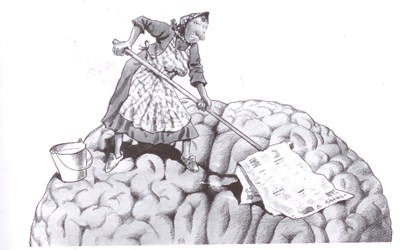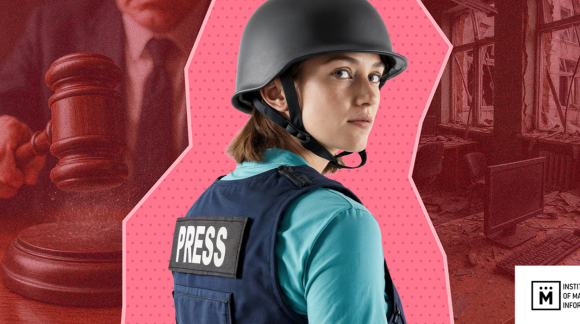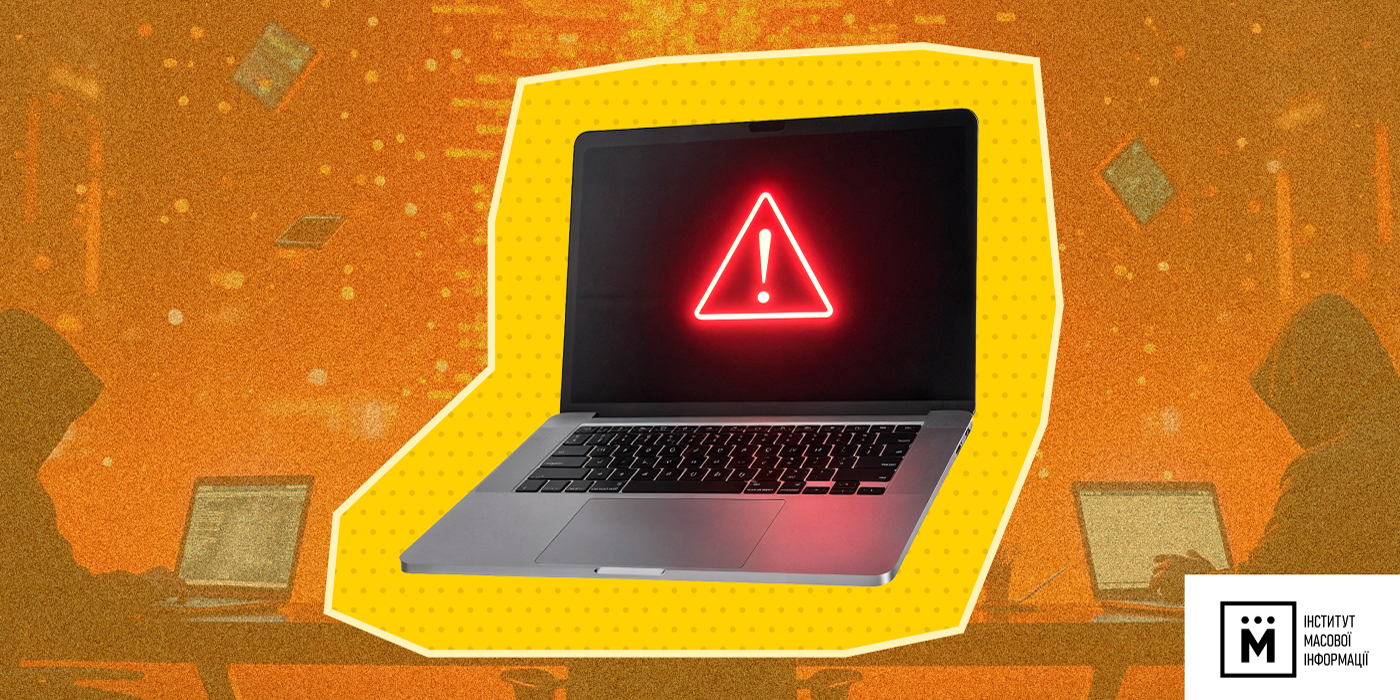
One of the topics of the News Integrity Learning Labs, that took place on November 28-29 under the auspices of the Internews Network and the Institute of Mass Information, and which IMI already wrote about, was the topic of media manipulations and the main methods of dealing with them, both inside the media environment and society. We are talking about the concept of media literacy. I would remind you that the laboratory included an exchange of experience between Ukrainian media theoreticians from public organizations and universities, and media representatives in Kyiv and the regions, and scientists from the United States and the European Union.
Types of manipulations
IMI spokeswoman Olena Holub began her speech on different types of manipulations used in the Ukrainian media by pointing out that manipulations “surround us everywhere in life”, not just in the media. As an example, she used the so-called “Black Friday”. Many disappointed buyers wrote that in reality no “price reduction” occurs: sellers “lower prices” after raising them beforehand.
It’s the same in the media where concepts are often substituted. But it’s not just that. According to Holub, she refers to purchased pieces, fakes, hate speech, a rhetoric of specific topic coverage, appropriately selected comments, manipulated photos and videos. The editorial policy behind such manipulations in Ukraine often neglects the interests of society and primarily serves the interests of the media owner.
Purchased pieces, which are published in Ukrainian media, often look very tumultuous and weedy, with primitive titles such as “politician N said this”, “politician N did that”, without any comments from the editorial board. When so-called experts appear in these kinds of materials, they are mostly from one pool and have often worked as assistants to the People’s Deputy or politician in the past. Now they talk favorably about them under the guise of an “expert opinion”.
Media in Ukraine can be manipulated unknowingly, due to its lack of professionalism. As an example, Olena Holub used the coverage of a tragic accident in Kharkiv on the evening of October 18, 2017. According to the expert, only 1 out of 10 sites covered by IMI monitoring on the subject of fair coverage did not immediately name Olena Zaitseva “the culprit” of the tragedy. As you know, the accident happened as a result of a collision between the two cars, and the 20-year-old girl admitted her guilt on December 13.
Manipulations can hide in the opinion section, too, for which the media allegedly do not bear any responsibility. Nonetheless, they have no problem highlighting certain phrases or parts that the author is most concerned with, especially when there is a suspicion that the author had paid for the column, and it’s a purchased piece.
Quotes used in headlines may also be considered manipulative. In this way, the media shifts the responsibility for the statement, which puts an imprint on the whole piece. For example, the website Obozrevatel in its title “A fantastic idiot”: Savchenko summoned to a debate after her statement on Jews” contained a quote of the politician Dmytro Spivak.
According to another participant, Maksym Savanevsky, about 40% of social media users read “headlines” without checking the news. And even the basic news that Ukraine’s GDP has grown can be published under the heading that it has fallen if you compare it to a particular date or use a certain time period in the past.
Other manipulations include the failure to declare the truth or the spread of half-truth. As an example of such a half-truth, one can recall the news from a propaganda site in Donbas, which posted a photo of the American flag on SBU (Security Service of Ukraine) building with a comment that Ukraine has already fully subordinated to the Americans. The flag was really there, but for exactly two hours, while an official US delegation was in the SBU.
Ukrainian mass media often hide or distort the truth based on the position of their owner. For example, media outlets owned by Kolomoisky suppressed any information on attempts made by Ukrainian International Airlines to hinder cheap low-cost airlines from entering the Ukrainian market. And the media which have an irreconcilable position regarding Lviv Mayor Andriy Sadovy talked about the “threat of typhus” due to a garbage crisis in the city, which was a clear fake.
Who is influenced by manipulations
Diana Dutsyk from Detector Media NGO noted that the notion of media should not be taken narrowly. Instead, one should turn to UNESCO’s advice which lists 10 media competencies on how they function, and how to use them in the context of critical perception of information. And then it will be easier to see the nature of manipulations, as well as to explain how they operate, to a wider audience.
According to her, Detector Media has studied 8 focus groups in the East of Ukraine consisting of 48 families, including those on the division line. “Total mistrust of the media, the state, its bodies. Russian propaganda has achieved its goal of destroying any trust. The people’s perception of things is not critical, they have a streaming and fragmentary perception of information. They don’t distinguish media, click on the news as such, without paying attention to which media has distributed it. There is also a background perception of information from a working TV set. And when you don’t trust the media, then you trust your loved ones, which contributes to the spread of rumors. And although they distrust the media, at the same time, people trust individual faces, leading bloggers like Anatoliy Shariy or Vadym Rabynovych.”
Dutsyk also spoke of her interaction with school teachers in the conflict zone. Many of them, according to the expert, are carriers of anti-Ukrainian views, “Education isn’t enough to change these teachers, it’s necessary to change the environment. There should be a comprehensive program for updating school libraries, they are the basis for obtaining information, therefore, they need modernization and Internet access. It must be taken into account that different age groups are subject to manipulative influences in different ways, depending on the region, conditions, etc. There are different types of audiences, we tried to type them and abandoned this idea.”
Svitlana Yeremenko from Pylyp Orlyk Institute for Democracy shared similar impressions. She said that, for example, judges in Bukovyna were surprised when they were told that it’s not right to use just one media outlet to receive information, while librarians in the Sumy region ‘were shocked by brutal manipulations by journalists, they have no clue what bias media pieces are.” IMI Executive Director, Oksana Romanyuk, who moderated the meeting, added that even in the academic environment not everyone knows about the existence of fakes.
Konstyantyn Kvurt, chairman of the board of Internews Ukraine NGO, said, “Society is made up of a conservative segment and an advanced one, which is scattered. Therefore, it is necessary to study how the media consumption of this conservative part occurs. These people don’t read much, they don’t read longreads. You need to be able to explain everything to them with 5-6 strokes. We don’t have the money for a long series, so we have to run video clips with short sentences. This is our asymmetrical response to propaganda.” Don’t give up, is Kostantyn’s summary.
Media literacy as a panacea?
The discussion was attended by Deputy Minister of Education of Ukraine Ivanna Kobernyk. She said that the course on media literacy has been approved (from elementary school to high school), it is on the variation list, and any school can choose to have it. It’s just that too often schools aren’t familiar with it, parents don’t show any initiative, so, in fact, the problem is communication. The textbooks and tutorials are great, Kobernik said but noted that, in her opinion, media literacy should be woven into traditional courses, “There is a joint project on civic education, media literacy, and critical thinking, and all this should be taught by one person. The teacher cannot teach one hour of media literacy and behave in the old way when teaching other subjects. We should stick to the concept of media literacy as a cross-cutting line in traditional subjects. The course of critical thinking is not a course of criticism. People lack basic knowledge.” Kobernik also pointed to a certain complexity of the courses, when a 4-grade pupil should already be able to discern facts from commentaries.
She was supported by the headmaster of Kyiv school №148 Serhiy Horbachov, a former journalist who has been teaching media literacy for seniors for 5 years. “I tend to believe that media literacy as a separate course has no meaning, but should be an integral part of the course on critical thinking. It is necessary to have an integrated course + personal communication skills, empathy, consumer literacy, the ability to check information (not only media), an understanding of one’s role in society’, said Horbachov, noting that high school students still perceive his lessons in a positive way, sometimes remembering basic things in the “background” mode”.
He also said that he received a lot of positive feedback from teachers when he posted an introduction of media literacy on the Internet, “The circle of people who deal with media literacy doesn’t really understand what they are dealing with at a lower level. We don’t really know the state of society and its readiness for such things. We need to reflect more on what we have.”
Ivanna Kobnernyk noted that teachers will now undergo retraining every year, not every 5 years, so she relies on teacher training institutes that should teach media literacy to teachers. “Improving qualification is one of the best ways. Standards are changing, media literacy will enter elementary school and go further,” said the official, noting the fact that in all other countries pedagogical universities are the drivers of education reform while here they are the main blockers. “They have forgotten what children look like, – said Kobernyk. – In Ukraine, reforms are supported by departments of education and school headmasters.”
Diana Dutsyk also mentioned the need to work with pedagogical staff in the context of media literacy. However, according to Kobernyk, so far only a few universities have been cooperating.
Corporate control
However, without a source of manipulation, there would be no problem, either. Therefore, as the editor of the Zaporizhzhia website 061.ua Tetyana Honchenko said there should be a “non-consolidation” agreement when we deal with unethical journalists, “Who, if not journalists, should control each other, but they don’t.”
Roman Kabachiy, IMI




